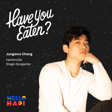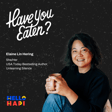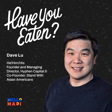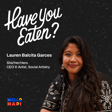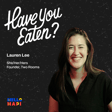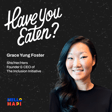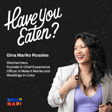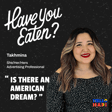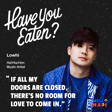Become a Creator today!Start creating today - Share your story with the world!
Start for free
00:00:00
00:00:01

From Refugee to Rediscovering Her Roots, Meet Muralist Thao Huynh French
Through a series of dynamic and thoughtful conversations between Ji Bowlus (she/her) and guests, we will showcase how wellness intersects with the rich complexities of our diverse Asian diaspora community. We will bring the voices of the Asian diaspora from the peripheral to the center to empower, reclaim agency, and rewrite the narrative of well-being one personal experience at a time.
Transcript
Introduction and Guest Introduction
00:00:00
Speaker
nourishing the mind, body and soul for the Asian diaspora. Have you eaten? Hi, everyone. Welcome back to Have You Eaten? um This is a series where we highlight the intricate connections between wellness, mental health, and the multifaceted layers of our Asian diaspora community. And by amplifying these voices and experiences, we seek to empower, reclaim agency, and reshape narratives. And I am so excited to have Tao French with us today. Tao is an artist,
00:00:34
Speaker
from san diego and we recently met and i just adore her work and um everything that she stands for so welcome how.
Tao's Art and Identity
00:00:45
Speaker
Hello thank you for having me. Yeah. And, um, you know, I've been going through your works, um, all the murals that you've done and they're incredible, like beautiful. And I noticed, um, I noticed that you paint a lot of flowers.
00:01:06
Speaker
Yeah, so I'm just curious, like um yeah just to start off, like tell us tell us how you identify. um And then I want to dive into like talking about your work. I just think it's so beautiful. Oh, thank you. I um i paint. Oh, well, let's let's start with introductions. My name is Tao French. um I identify as she, her, hers. And I'm a Vietnamese-American artist, muralist, and photographer. I do a lot of activism work. um a lot of my artwork, I do paint tons of flowers and I incorporate a lot of flowers. Those are the things that I have found um to provide me with a lot of joy and connection with my family. And so, um you know, growing up with my my grandmother and my mom, like planting flowers and gardening, it just really resonates with me. And so that's like my
00:02:00
Speaker
the one of the few things that I have left that I can paint to sort of um feel more connected with them. Oh, that's awesome.
Understanding 'Home' and Cultural Identity
00:02:10
Speaker
did you Did you grow up in the States? Yeah. Or tell us about that journey. I was born in Cameron Bay and migrated to the Philippines. My family and I were processed as refugees at the Southeast Asian Refugee Processing Center in Bataan, Philippines. And we moved to the States when I was around when i was like three or four
00:02:34
Speaker
um We lived in North Dakota for a little bit, but it we migrated to we moved to ah Fresno, California, and that's where I like grew up mostly. I've been living in San Diego for about 14 years, though. Oh, wow. Yeah. your um your youre You immigrated here the same the same age I was. So for me, it's like, I don't really know any other home other than here. um Is that how you feel? like where would If you someone asked you, where where is home? like Where would you say that is?
00:03:10
Speaker
Um, it's kind of a complicated answer. I've never really felt like I've belonged anywhere to be honest. Home. Always where the heart is. I was just kidding. I wanted to be a little corny. No, i'm I'm actually in the process of discovering that now. So yeah I so feel different when I'm in Vietnam. I got to go back last year for the first time. And that was that was a truly life-changing experience. um i feel the I feel the most comfortable when I'm at my own house to be on. Like your own space.
00:03:53
Speaker
Yeah, so tell us about when you went to Vietnam like what was the what was the feeling? um Like what what was life-changing about being there and how long was it between you being there and and going back I hadn't gone back since I left at the age of three. so oh And I was always fed these stories that it's a dangerous place and our extended family are not good people and you shouldn't reach out to them. So there was always these like rumors and stories that are circulate that circulated. And so I i had a very like undefined, um ambiguous like perspective with what what Vietnam
00:04:39
Speaker
looked like, and when I went back, I totally had culture shock.
Vietnam Visit and Cultural Reflection
00:04:43
Speaker
I learned the term Viet-Q for the first time. Viet-Q means you're a Vietnamese living abroad, and I i didn't realize that was the term for us. And so when I went back home, um I would always be asked, like, are are you Viet-Q? And then they would ask, are you Vietnamese American or Vietnamese Australian? Because I guess that's where a lot of Vietnamese diaspora is, and I was like, Oh, American and, oh, California. And they're like, oh, you look more like Australian, Vietnamese. And I was like, what what does that even mean? But I did get charged double at some places just for being a bit cute. Oh my gosh, termination tax.
00:05:26
Speaker
Oh my gosh. ah i I was wondering, did you did you find family or did you go to visit family or what was the trip ah for? To be honest, i it was 2022 December when I had booked my flight and I was just like i was having some beers and I was like, maybe it's time you know when you're just having those like drunk thoughts. You're like, it's time. It's time to go. and So I booked my flight on a whim and I didn't have any plans. I just wanted to go back and and see see it for myself. And when I did finally go, I had invited a couple of friends to meet me out there and they did surprisingly. I'm like, that's a long way to meet up with a friend to go have some food. But they ended up having a really good time. and
00:06:13
Speaker
What I discovered was there's a ton of foreigners living in Vietnam. So there's districts that are dedicated just to expats. There's ah a ton of Europeans that live there, Koreans, Japanese. um they They do business and they also live there. And you know just to see just to see how like evolved it is in comparison to what your parents painted. Um, for you. And, and so I was like, mom, it's still, it's different. They're so innovative here. And they're, it's like a clash between modern and old school, you know, because you still have those like old school stalls and, uh, street vendors and, um, that Vietnam nostalgia that yeah picture.
00:07:01
Speaker
And then there's this like other side to it that, you know, there's like a tattoo, rap music um industry and scene that's emerging. There's Chicano culture in Vietnam out of like, how crazy is that? um And yeah, it's such a magical place. Like you it totally captivates you when you get there. And all and all I wanted to do was just like eat and meet people and paint. And I did get to paint a mural while I was there. I just met some French um people who owned this like art and a food um and beer spot. And I was like, I would love to paint for you. And now we're really good friends and we haven't you know we haven't lost touch since.
00:07:49
Speaker
That's awesome. Wait, I want to go back to some a word that you said when you and I don't know if you heard yourself say this, but when you were talking about going back to Vietnam, you said, OK, it's time. It's time to go home. Oh, yeah, totally.
Art Inspired by Childhood and Family
00:08:05
Speaker
I think my heart is definitely. um Like with Vietnam and it always will be just when I was there, I was a ah very emotional, um like just I remember this one moment I was taking a shower and I could smell someone cooking garlic. And, you know, and there's like this background noise conversation in Vietnamese and it just like got me so emotional. hit for my
00:08:36
Speaker
what was it What was it like living here with your your family? like um because I'm and kind of seeing this picture of you growing up and and planting flowers with your ah family and then how that shows up in in your artwork. um And I'm wondering, like you you know and we talked about belonging and not feeling like you really belong unless you're like in your home. um So I was just curious, like what what what was it like growing up um you know as a little kid, um not feeling like you belonged here? And the reason why I asked that too is I felt very similarly. like I remember the first time someone said, um gook, go back home. I was five.
00:09:23
Speaker
And I just remember thinking, like, I don't understand why this guy wants me to go back to my apartment right now. Like, I didn't know, like, what he was... talking And then I didn't know what Guk meant. And so my dad had to explain it to me at five years old. I'm like, but I don't understand. Why does he want us to go back to our apartment? And my dad's like, no, no, no, no. That's not where he wants us to go. But I remember, you know, thinking like, but this is my home. And I remember even you know as a teenager or even as a young adult thinking, but this is my home, but also feeling like I didn't belong. That's a weird feeling. Yeah, totally. Not having that sense of belonging as a child can really mess with you as an adult. And I think that's why I'm steering so, so hard into trying to find out where I come from. and
00:10:17
Speaker
uming my refugee story and exploring my cultural roots. So i'm in I'm learning all about who I am, where I come from in real time. Yeah. And how does that show up in your work? Because I i see i feel like i I see it, but I would love for you to talk about it. I think for the Vietnamese American experience side of you know my life, um my mom, definitely wanted to leave a lot of Vietnam behind. And so, you you know, tried to blend in quite a bit. And so there's these, you know,
00:11:00
Speaker
it's it's tough to talk about, but I'm, you know, there are moments of joy. that I hold dear to and that that's the gardening that's the being around the plant and that's why you see a lot of flowers in my work because these family photographs that I still have they're like us little us you know like my mom young in her dress is posing in front of flowers and so I find that so endearing, and I and i love to be able to to to continue to incorporate that into my work, no matter what the what the ah theme is. you know There's always going to be some flowers or plants in my work. And then there's the side of the food you know that really that makes me feel much like felt feel loved and feel connected to my family.
00:11:51
Speaker
and you know being refugees and coming here without anything and filled with trauma and ah generational trauma and just ah living in poverty. I think that it had, you know, it it shows up in the way that we interact with each other and it shows up with I witnessed a lot of like abuse, I endured a lot of abuse. And it still shows up in my relationships with the especially with the women in my family today. So
00:12:27
Speaker
My childhood, I would say, is super it was very ah turbulent, but it had such a contrast. There was like these moments of escapism and joy and you know what family actually means to me. And then there's like this other side, this like dark side that I never really talk about because I feel like such an alien when I talk about it.
Family Communication and Generational Healing
00:12:52
Speaker
I feel like nobody would relate. like I feel like our family is so wildly different and mean and cruel sometimes. And I feel like that is so non-relatable to anybody else. i I do remember bringing up like, oh, your family is the going over to my friend's, my white friend's house for sleepovers. You know, I'm like, wow, you guys like talk to each other and you, you know, like I would watch the dynamics between like the mom and the daughter and like when the daughter did something bad and the mom was like, you know, kind of go through like, hey, that wasn't right. And but being able to kind of get through the other side um with civility. and I'm like, that's what is that? That's so crazy, you know, to to like witness something like that. And I just remember feeling like, so foreign to it.
00:13:48
Speaker
Yeah, and i I could relate to that 100%. I remember thinking when growing up, like, like, what, you're not gonna get your ass beat right now? Like, what? What's happening? Yeah, I, I do have a lot of those memories too, where you do something, you know, like, like wrong, but not enough to justify an ass whooping. And yeah, you know, you go to your friend's house, you see that happen over there. And you're like, wait, I would have gotten my ass kicked. And we just got like, Hey, that was an okay. Can we have a hug now? And I'm like, Whoa, that's crazy. yeah Do that over here. Um,
00:14:32
Speaker
We could probably go down this road with you if you want to. Oh my god. It was like that. So I i used art and a lot of other things like you know being around plants and like being in sports, watching TV, like steering really into the imaginative side because that form of e escape escapism was like really important to me. it made me um It was a form of therapy, I think. Yeah. How old are you when you started painting and doing art? um I would say as early as I could pick up a pen, you know, so like kindergarten.
00:15:13
Speaker
Oh, wow. And would you say that... So when you were in kindergarten versus now, like the escapism, the the purpose of art as a little kid, would you say changed as you grew older? Because it seems like a lot of your art right now, um at least the recent ones, are very... There's so much emotion into them. So there's this like, some of them i I noticed there's this contrast of this very like powerful, like there's some, you know, very definite like power in them. And then there's like these beautiful flowers surrounding it. And I'm wondering if that's your way of, you know, um, I don't know, tell me, tell me about that. Cause I have my own opinions about why you do that, but I'm just curious.
00:16:03
Speaker
I like to use a lot of themes that contrast each other because it forms balance for me. um I think the feminine, like the femininity and the masculine um like elements in my work go very like, you know, the sharp lines, the high contrast with the black and the whites. I i love depicting things like that because I am constantly feeling um and ah array a spectrum of emotions. Like I'm sad and I'm happy and I've gone through really awful times, but I've also, I want to emphasis on the victories and like the moments of happiness. And so i I think naturally like those themes and those like emotions show up in my work.
00:16:53
Speaker
Yeah. I was thinking, you know, the, the fact that like we as humans are just not, it's nothing's like linear, right? Like healing isn't linear, like pain isn't linear. Like you can't have happiness without sadness. And so when I look at your work, I think of the holistic, like picture of what you might be going through or what might be going through your mind, which isn't like linear. It's like, there's so many different parts to us, you know? And that's the other thing about being Asian American too, is we're not a monolith. And we say that a lot. And so our experiences are very, are very unique, but also similar in so many ways, which I think is beautiful.
00:17:44
Speaker
Yeah, I think um my experience is definitely a lot different than, you know, my friends' experiences. But you're right, there are a ton of similarities. And these similarities are oftentimes we emphasize like the bad parts. Oh, that's what we have in common. You know, like this trauma is what we have in common. Oh, your mom's like this too, or your relationship with Asian women is like this too, like, and To be fair, I mean, this is the first time in my life I've ever felt supported by Asian women. And I think that's breaking the side. That's like a true sign of like us breaking the cycle of generational trauma. Because so to be honest, growing up, I've just seen women just at each other all the time, criticizing each other, fighting, um tearing each other down. like Where's the encouragement, love, and
00:18:42
Speaker
determined that we all need in order to feel confident and really um proud to be who we are. Yeah, yeah. Did your family also, were they also really blunt? Like I always tell people like um I get my bluntness from my family just because they didn't know how to couch anything. But it was like their way of showing their care. It's kind of like, it's like, have you eaten, right? It's like, you're not saying I love you, but you're, yeah but that's basically what it means. It's like, I care about you. Like, I want you to... have your tummy filled, you know? um And so there were times when my dad would say like, it's so bad. He would say, oh, you're so fat. but then And then he would try to couch that later on in life being like, oh, you must be so happy because you've eaten so much. And I'm like, okay, he's trying.
00:19:48
Speaker
It's not quite there. um And I just found that my family had a really hard time talking about emotions. And so the way that they did it was just like blunt. Like, I'm just gonna tell you how it is because I care about you kind of way. And I'm just curious if you can relate to that. Oh, yeah. We did not talk about our feelings growing up. We expressed them through... I don't know. toxic behavior and food, you know, like let's let's talk about the good stuff too. I know, I'm, I know that a lot of us have been through so much and and it's important that we talk about that. And we, when we do also set like really strong boundaries now, because that's really, that's important to me. I'm i'm learning, Oh, that's codependency nature when you're like, be
00:20:42
Speaker
ah to manage other people's lives, like ah get offering advice when it's not offered, trying to help and forcing that help down someone's throat, that's codependency nature. And I'm trying to unlearn a lot of those habits that I'm you know learning from my parents too. um But now it's it's it's different because i'm I'm setting up these boundaries, I'm having these honest conversations with my mom. um And for example, we've always like cut each other off I've always been the one to get kicked out of the house. And until I finally, I didn't come back for a long time. And then, you know, now she, she does these cutoffs with me. She'll hang up the phone if the conversation gets a little bit too intense. On my end, um this is where like our, our lie, I don't really know how to explain it, but my mom is Vietnamese dominant speaking. I'm English dominant speaking.
00:21:42
Speaker
So sometimes my context is aggressive for her and her, her Vietnamese is aggressive for me sometimes. So I feel like we're growing kind of apart because of this here and it wasn't always that way. Vietnamese was my first language, but now what's happening is we're, we're actually, she's actually telling me what it is that I'm doing that's bothering her, which she's never done. um She's saying, well, when you talk to me like this, it really upsets me and it makes me feel this way. And here's why, because, oh, wow. Yeah. She's actually looking inward and figuring and actually expressing to me, um, like where these, uh, where the the roots of these traumas are coming from for her. And that's what's triggering her. I'm like, Oh, wow. Mom's like,
00:22:36
Speaker
expressing her triggers right now, and she's like figuring out where it comes from. That's huge. That's huge. So that happened pretty recently, like past month, I would say. And um i I feel like I've grown enough, you know, through a lot of work with self-help books and going to therapy and a ton of other things. And I'm figuring out like, oh, my reactions are actually not healthy either. It's okay for me to feel angry and sad and depressed and you know these things and like how I react has everything to do with like my like
00:23:21
Speaker
am I being healthy with the way that I'm communicating my um my emotions? And when I express myself, when I'm angry, is it in a way that is harming other people? Because it could cover the tone or it could be, you know, I don't know, like the cut offs thing is so common too. But if we're not using communication, and we're just choosing to create more conflict, then that's when it becomes incredibly unhealthy. And then, you know, you have to ask yourself, it The way that the way that I'm communicating, is it effective? Is it actually what I want? And so I'm I'm like learning all of this right now, like all at once. And I'm realizing even when my mom is triggering me, I don't actually have to react to it. I can I can express my
00:24:12
Speaker
myself differently so she understands, oh yeah, maybe that doesn't make my daughter feel good. So maybe we shouldn't go there. Maybe we shouldn't talk about people's bodies, you know? yeah yeah yeah Yeah, I mean, if you're you're breaking the cycle is what I'm hearing. And also this i this um this idea of understanding other people too. So not in a codependent way, but in a way that's understanding, right? Like when when your mom expressed that, um you know, what's triggering her.
00:24:45
Speaker
And then thinking through to like, this is where my forgiveness for my dad happened was when I realized that he also was a little boy. He also went through stuff. He also had a lot of dreams that didn't come to reality. And this understanding and it's no way excusing people's behavior or you don't have to accept their responses. But having that understanding and that curiosity of these, the people that hurt you, it, it made, made my triggers less because it was less about me and it was more about, okay, how are they dealing with things? Um, but yeah, I love that story about your mom and you know, even though like it's later in life, like the fact that it's happening is pretty awesome. Yeah. I, I'm,
00:25:43
Speaker
I've always been a huge believer of people, people and their transformations. I think that there's always you don't always have to engage in toxic relationships. You can walk away if that is the best decision for you of too many lines are being crossed. But absolutely, you guys can and we can come back together when the time is right when we're both like at a place where we could meet each other in the middle somehow.
Family History and New Connections
00:26:09
Speaker
I think what we need to normalize too is not making enemies out of each other just because we agree on certain issues. Like with my family, it's i like i like I was saying earlier, we're really different, especially with the way that we fight. So these small breakthroughs that I'm having with my mom, they so they feel massive to me. They feel like these are moments of magic.
00:26:34
Speaker
And you know like what's to come? like This is just this the the beginning. like What is there to come? Can we start taking trips together? Because we've never done that before. A lot of people get to do that with their families. I don't. Because we we fight. we don't We can't spend more than three hours together without someone's feelings getting hurt. And so how do we how do we prevent that? Or not even prevent that by like walking on eggshells. But like how do we actually discuss what's what's really going on? So we passed it and let go of this anger. Right. um you don't You haven't talked about your um father.
00:27:15
Speaker
um
00:27:18
Speaker
I'm just curious, um like is your what's your relationship there like? Is it similar or is it different? Well, I don't have a relationship with my dad. growing up he was there but just as like an entity like not really as a person that I that I had a a good relationship with and I think is this common with most Asian dads like I don't know very surface level very transactional based relationships where like we would ask him for money or new school clothes
00:27:51
Speaker
um My parents were divorced when I was 11, I believe, and like that was awful. you know There was just a lot going on there. so When my my parents divorced, um but let me take it back a little bit, my dad knocked up my mom's best friend and that's why they got divorced. and What's crazy about this story is that I just had an ancestry DNA test last year because my mom had asked me to like like kind of help her find her biological father. She's, she's half white. And um my, yeah, I'm not gonna take it way back, but my my mom thought she found her biological father about 20 something years ago, and he denied having anything to do with her, but that the resemblance is so striking. Wow.
00:28:43
Speaker
And um just recently, like in the past year and a half, my mom asked um me to do the Ancestry DNA with her, and so we all did. And, you know, we got connected with a bunch of ah Canadian people and European people. And yeah, I have a ton of of cousins in Vietnam, and I have a cousin who's French in... Montauk? I don't... Anyways, um I digress, um but my mom And I have been trying to find her biological father together. And on my results, I see my half sister's name pop up. Like we've always kind of knew about her, but we'd never. yeah And so she reached out to me on Instagram just last year after I had painted in Hawaii. And she said that I saw your name on on ancestry DNA is I, I feel like it's safe enough for me to reach out to you.
00:29:41
Speaker
And so we started talking and we finally met like in October of last year. Yeah. Oh, wow. Crazy story. And then from my half sister, I find out that she's never seen my our dad's face. So on Father's Day, she like messaged me and asked for a picture of him. And so I asked my family if we could forward a picture of him to Amy. And so we did. And so she finally got to see his face for the first time. like oh my god on too Oh my gosh. you for sharing Thank you for sharing that vulnerable story. and like
00:30:21
Speaker
Oh, yeah. i Growing up, my dad was in the military. um And I mean, you think of all the stereotypical military fathers. That's right basically what it was. But yeah, so and my mom actually left. um And so we have kind of a flip-flop story. um So my mom left when I was four. Last time I had contact with her, I was five. And um i it's so funny you bring up Ancestry because I just thought... So through of my years, I went back and forth, back and forth of whether or not I wanted to find her. And I've just recently determined that I'm gonna go look for her.
00:31:11
Speaker
And Ancestry came up in my mind actually literally this morning, which is crazy. um But yeah, just to switch gears a little bit, I'm really excited to like, we haven't met IRL in person in real life, and I'm so excited to meet you in person ah next weekend, right? It's coming up soon, the 15th. so i I hope that before we jump forward, I hope that you your journey, you're you're doing a lot of, you know, you're taking care of yourself throughout that process of trying to rediscover and reconnect because as I went through my process and my journey with trying to reach out and trying to figure out like, you know, keep putting the pieces our of our family tree together, it's yeah to trigger people in my family.
00:32:02
Speaker
And it turned into a ah big fight. And yeah, and so I'm i'm tabling it for now. And so I have had to deal with a lot of mental health issues since. So I hope that you are taking care as you do. Thank you. you yeah Yeah, I definitely, um so my i my father passed away um three years ago. And so there's no, But he was actually supportive back in 2007. I took a trip to Korea. That was the last time I was there. And um I spent about a week and a half in the town where my mom was born and raised. And I didn't i didn't
00:32:48
Speaker
I couldn't get up to knocking on the door. And who knows if they still live there or not. They might not have. But um I found the house and everything and I just walked by it every single day and I didn't do it. But I think now I'm at a point in my life where Honestly, I just wanna know the story. i i I've heard so many stories from my dad's side. And so I just wanna hear her story. I wanna know like, yeah, for me, I just wanna hear the story of, and I have no animosity towards her anymore. um I'm not angry, I'm not sad, I'm not any of those things. It's more about like,
00:33:37
Speaker
I just want to know, I just want to know what happened and everybody's story is different. you know there You always say there's three sides to a story, his, hers and the truth. And um that's just kind of where my head is and just the curiosity of where do I come from? Yeah, I i can definitely relate to that. um When I went back to Vietnam last year and I did meet some family, I met my aunt who I've been writing letters to since I was a kid, but at least stopped abruptly. And ever since I've been told about how she's not a good person and things like that. And so my mom reached out to my aunt, connected us, we met up, I flew to Cameron Bay where I was born, met her and had the best time. Got to listen to her versions of the stories
00:34:35
Speaker
upbringings, although I will say she was very held back with a lot of them and was trying to reinforce this idea, like we forgive each other, we forgive each other. I was like, what happened? um But yeah, just that rediscovery, that what i'm what I'm learning is that I don't know, that I don't know everything. So be open to all, to it all as it comes. And it's only going to help shape your perspective as life as you age. because black people and I'm a human being, I've made mistakes. My mom, if I had gone through the same things my mom has gone through, which is a lot and very sad and messed up, I'd probably be as angry as she was too. And I'd be closed off as as much as she is, maybe even worse. I don't know.
00:35:27
Speaker
um But I'm i'm starting to to forgive and learning how to do so through compassion and empathy, looking at them as if they are human beings too, not just these individuals that messed me up when I was a kid or whatever.
Empathy, Compassion, and Personal Healing
00:35:41
Speaker
you know Because yeah just that meant that mentality just doesn't serve me. It helps me hold on to a lot of hurt, and that doesn't work. right And the thought that like everyone just does the best that they can with what they have. And you know um unfortunately,
00:36:01
Speaker
you know the generations before us, therapy wasn't something that was talked about openly or mental health or wellness or any of that kind of stuff. right So yeah they they had what they had and they did what they could with what they had. um that that's yeah The empathy and compassion, definitely important. um
00:36:28
Speaker
Wait, are we only a first episode of Hello Happy? Um, no, this is probably going to be the second episode that's going to go live. Okay, great. Yeah. Yeah. But I i love having these conversations because you know It just goes back to the idea that there are there's so many things that are not the same, but also the same. And the idea of like empathy, compassion, curiosity, i mean those are all so important, not only for us finding self-love and our own healing,
00:37:05
Speaker
But also putting that out into the world where, um I don't know, it's just, it's just different. Like you look at different, the lens of what you look at things through is different with compassion and empathy.
Tao's Art in the Community
00:37:20
Speaker
um So yeah, you yeah me things a lot less personally.
00:37:27
Speaker
Exactly, exactly. um Gosh, how do I how do I transition from this to haven't met in your life like you're saying, we yes, yes, with your mom, I wanted to bring us back because I wanted to to sort of just, you know, and a little something for you as you look. Thank you. I appreciate that. Yeah, yeah i I'm actually gonna um i'm actually ah documenting my process. Oh, yay. I would love to hear about it. Maybe we could interview I can interview you. Thanks. Yeah, that'd be fun. um But okay, I want to hear about this piece that you're going to bring. So can you tell the audience a little bit about what we're doing um on the 15th of June? Yeah, so the for
00:38:12
Speaker
That's next Saturday. It's going to be just a one day, um, API fair, uh, or API day at the San Diego County fair, um, in Del Mar. We're going to be part, I'm going to be creating an eight by eight mural installation, live painting it, um, at the fair. And I'm going to be creating an, and um, an activity at the AARP table, which who is sponsoring this event, by the way, um We're going to be inviting people of all ages to come up to the table to create their own dragon scales. So we'll have paint and colors and glitter and whatever for them to decorate and we're going to incorporate each scale onto the dragon that I'm going to be painting. So I'll leave that area in the scales blank and then we'll just have everybody contribute to it at the fair and then Hello Happy
00:39:03
Speaker
you and RiRi are going to create an activity as well with paper cranes. Yeah, yeah, we're excited to be part of it. And um so like grateful to have been introduced to each other. I actually met some AARP marketing folks in Texas last week. And we're, I mean, I don't know if you've met the ones in San Diego, but if they're like half as fun as the ones that I met in Texas, like we're gonna have a good time. Let me tell you. you're gonna laugh now Have you met it yeah from the organization here locally?
00:39:39
Speaker
yeah No, but one of the women um took a selfie and sent it to Tiffany, I think her name is. That's going to be at the event. yeah Tiffany's awesome. yeah Tiffany has been such a beacon of light in my life. and I met her at the Dave remembrance for the Atlanta spa shooting victims at the museum. I had um put together a live painting event there, painting ah flowers as an offering. And we we met that day and kept in touch. And then because she works at AARP, this is why relationships are so incredibly important. she She came back like two years later with an opportunity for me to paint for the AAPI community, for for her for her organization. and That's awesome.
00:40:37
Speaker
Since then, we launched that December of last year. And since then, we've come back to work on this project together. So it's it's so great to have like connections that that help that want to help you succeed and vice versa and listen to your ideas. like This is going to be a really great relationship for you to have. um This organization just really wants you to win. Yeah, yeah no i can I can definitely see that. And I i want to do a ah shout out to Daphne Kwok. That's the woman that I met in Texas. I mean, she's so fun. I was like, I can't wait. I can't wait. Like I said, if if the ladies in San Diego are half as fun, ah like it's just going to be a good day. I'm so excited.
00:41:30
Speaker
Yeah. um But yeah, ah our time is running out. um But I like, gosh, the stuff that you shared with us today, um beautiful, and just the message of, you know, compassion and empathy and, and like being in the other person's shoes, you know that's part of it, right? and um And the healing and the work that you're doing and the way that you're doing it is just so admirable. um And i love I love everything about your artwork. like I am so in love with like all the colors and just the emotions. And like I said, when I see like the
00:42:14
Speaker
the differing kind of contrasts in your work, I can see how that's such a representative of being a human being, you know? I love the interpretation. Thank you. Yeah. I think what I would like to add to that is if you if you take a closer look at my work, it's there's a lot of imperfections and a lot of abstract nature to it. And I think that because my work largely depends on imperfections, um to to have the look that it has, I think it also speaks to you know the imperfections of life and the imperfections of you know the the journey to wherever you're trying to go. So yeah like just embrace it.
00:43:01
Speaker
I love that. So please come out and visit us on Saturday, June 15 at Del Mar, AAPI Day at the San Diego County Fair. um You'll find Tao, our friends at AARP, and Hello Happy in a row together. So if you find one of us, you'll find the rest of us. um And yeah come come hang out come play with us come put some dragon scales on the mural ah make some cranes with us we'll have some fun activities and some giveaways ah from our product sponsors that we're really excited to announce soon.
00:43:40
Speaker
And yeah, and then until next time, um oh, before we go to how, how can people find you? Like, what, where can they see your work? Like, where can they find you? Oh, um it's just mainly Instagram right now. i've I don't know how I've gotten by without a website, but I'm like, nobody visits your website. They'll just go to your Instagram. So Tal French art, that's T-H-A-O, French art on Instagram. Amazing. Yeah. All right. Well, folks, yeah, thank you for being here. Thank you for being you and um sharing all that you did with us. And until next time, um this is G. Bolas with Hello Happy and Have You Eaten. And um until we meet again, hope your stomach and your heart stay full. Thank you. Bye.
00:44:36
Speaker
Hello, happy fam. Thank you so much for joining us today. Make sure to subscribe, like, and hit the notification bell. And until next time, I hope your bellies and your hearts stay full.

